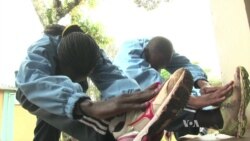In Kenya, refugees from other African nations are training at a special camp and competing for a limited number of slots in this year's Rio Olympics under the flag of the International Olympic Committee (IOC). It is a first in Olympic history.
Twenty kilometers from Kenya’s capital Nairobi sits Ngong - where a select group of athletes is training for a chance to run in the Olympic games in Rio de Janeiro, Brazil, this August.
The athletes, who number around 30, are all refugees from various war-torn countries in Africa. They're training at the Tegla Lorupe Training Center for Refugee Athletes.
Twenty-year-old Rose Nathike from South Sudan runs the 800- and 1500-meters. For the last 16 years she has been living at the Kakuma refugee camp in northwestern Kenya along with her siblings.
The huge camp hosts about 200,000 refugees from Eritrea, Congo, South Sudan, Somalia, Ethiopia, Uganda and Rwanda.
Nathike says life in the camp is hard.
“Before we came here we had been facing a lot of challenges due to the hot weather in Kakuma and the place is too dry that we cannot [be] able to stay but we adopt the situation where you are,” she said.
Now, she and the other athletes in Ngong train twice a day - beginning each session with 45-minutes of warm-up exercises before starting their workouts.
Dawood Abubakar fled Somalia in 1998 and has been training at the camp for the last five months. He hopes to run in the Olympics' 5,000- and 10,000-meter races.
Abubaker says the chance to compete under the Olympic flag - and the training camp itself - have improved his prospects.
“When we were in the camps we don’t get time, but now most of us we are improving time, we have got good time, you have got good coaches, you know when you are training in the [refugee] camps you can’t train the way that you want - you go and come back, but here you get the coach,” he said.
With the help of national Olympic committees, the International Olympic Committee (IOC) is identifying a select few refugee athletes for the games.
Kip Keino, a two-time Olympic gold medalist himself, chairs the Kenyan Olympic Committee. He tlold VOA there will be high standards for qualification.
“The training is going to be very hard, you’ll find some training with our athletes in some of our training camps, and this is the most important," he said. "We want to encourage them, those talented, to be able to perform well.”
In a few months, some of these athletes may make history by running in Rio under the flag of the IOC.





